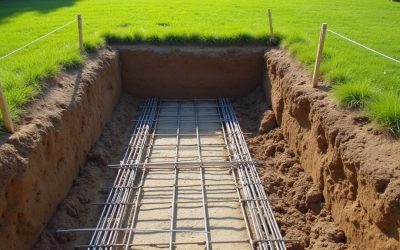Most homeowners finance their extensions through home equity options like cash-out refinancing, home equity loans, or HELOCs, which typically offer lower interest rates than personal loans. You'll need at least 15-20% equity in your home and a credit score around 700 to qualify. Construction loans provide another viable option, requiring a 20% down payment and a minimum credit score of 620. Government programs can also help, offering attractive fixed rates starting at 3.15% for energy-efficient renovations. Your best choice depends on factors like your equity position, credit score, and comfort level with using your home as collateral. Understanding each option's details will help you make the smartest financial decision.
Most Popular Financing Options

Traversing the financial landscape for home extensions can seem intimidating, but homeowners have several reliable options to fund their projects. When you're ready to expand your living space, understanding these common financing methods will help you make an informed decision that aligns with your financial goals.
A cash out refinance offers you the opportunity to tap into your home's equity by replacing your existing mortgage with a larger loan. You'll receive the difference in cash, which you can use for your extension while potentially securing a lower interest rate. Taking time to research market conditions can help ensure you secure the most favorable financing terms. Notably, enhancements like increased living space can significantly raise your home's value, further justifying your investment.
With home additions costing an average of $46,343 in 2023, careful consideration of financing options is essential. If you prefer to keep your current mortgage intact, a home equity loan might be your best path forward. This option provides a fixed-rate loan against your existing equity, delivering a predictable payment schedule that many homeowners find reassuring.
For those seeking flexibility, HELOCs provide revolving credit with competitive rates, while construction loans offer substantial funding based on your home's future value. Each option comes with its own set of advantages and considerations, so you'll want to evaluate your specific circumstances, including your equity position and comfort level with different payment structures.
Home Equity Borrowing Explained
In light of rising home improvement costs, understanding home equity borrowing options can help you make the most of your property's value. When you're ready to tap into your home's equity, you'll primarily encounter two choices: HELOCs and home equity loans. Each offers distinct advantages, with HELOCs providing flexibility through revolving credit, while home equity loans deliver predictable fixed payments. Lenders typically allow borrowing up to 80% of value against your home. Most lenders require a debt-to-income ratio below 43% to qualify for these loans. Additionally, capitalizing on home equity for renovations can lead to an immediate boost in property value, especially in a competitive market like Manchester.
Before diving into home equity borrowing, you'll want to reflect on these key aspects:
- You'll need at least 15-20% equity in your home and a credit score around 700, though requirements vary by lender.
- HELOC advantages include interest-only payments during the draw period and the ability to borrow only what you need.
- Fixed-rate home equity loans offer stability with consistent monthly payments and a structured repayment schedule.
- Home equity risks include potential foreclosure if you default, and variable rates on HELOCs can increase your payments.
Understanding these options helps you make an informed decision that aligns with your financial goals.
Understanding Construction Loan Basics

While home equity borrowing taps into your existing property's value, construction loans offer a different path to finance your home extension. You'll find several construction loan types tailored to meet your specific needs, each with distinct advantages for homeowners like you who are ready to expand their living space. Before starting the design phase, getting a verbal preapproval from your lender is highly recommended.
When you're exploring loan repayment strategies, you'll need to understand that construction loans typically work in stages. You'll receive funds through scheduled draws as your project progresses, and you'll usually make interest-only payments during construction. Lenders will expect your DTI ratio below 45% to qualify for conventional financing.
Most loans require a credit score of at least 620 and a down payment of up to 20%, which helps guarantee you're financially prepared for this investment.
You've got options when it comes to structuring your loan. Construction-to-permanent loans seamlessly convert to a regular mortgage once your extension is complete, while construction-only loans might better suit you if you're planning to refinance later.
Government Programs Worth Considering
Government-backed incentive programs provide substantial financial support for your home extension project. When you're looking to expand your living space, both federal incentives and municipal programs can help make your dream renovation more affordable.
These programs often come with attractive benefits like low-interest rates, flexible repayment terms, and access to additional utility incentives. Fixed rates starting at 3.15% for 10 years make these options particularly compelling. The Community Housing funding increases support for local renovation initiatives while also considering local regulations that affect home extensions.
You'll find several programs worth exploring for your home extension:
- The Home Energy Loan Program offers up to $125,000 in Toronto, perfect for combining energy efficiency with your extension plans.
- Energy Retrofit Loans provide fixed, long-term financing with competitive interest rates aligned with city borrowing costs.
- The Housing Accelerator Fund supports local housing initiatives that could benefit your extension project.
- The Affordable Housing Fund offers low-interest loans that you can use for substantial home improvements.
Before applying, you'll need to complete a home energy assessment and secure lender consent if you have a mortgage.
The application process includes detailed documentation and technical reviews, but don't let this discourage you. The long-term financing options of up to 30 years and flexible repayment terms make these programs particularly attractive for homeowners like you.
Personal Loans Vs Traditional Financing

Choosing between personal loans and traditional financing can make or break your home extension project. When you're exploring alternative funding options, it's essential to understand how each choice aligns with your project budgeting goals and financial situation.
Construction costs for home additions typically range from $22,000 to $81,000. Personal loans offer a quicker, more straightforward path to funding your renovation. You won't need to use your home as collateral, which means less risk if you encounter financial difficulties. The approval process is swift, with most personal loans taking just 2 to 5 years to repay. Additionally, many homeowners opt for extensions based on local builders' expertise, ensuring their projects are in capable hands.
However, you'll typically face higher interest rates and shorter repayment terms, which can strain your monthly budget.
Traditional financing options, like home equity loans or HELOCs, often provide more favorable terms. You'll benefit from lower interest rates and longer repayment periods, making your monthly payments more manageable.
If you've built up substantial equity in your home, you might find that a HELOC's flexibility perfectly suits your needs, especially for larger projects with varying costs.
Consider your home's current equity, the project's scope, and your comfort level with using your property as collateral.
Final Thoughts
After exploring financing options that'll make your home extension dreams a reality, you'll find there's no one-size-fits-all solution. Whether you're tapping into your home's equity, securing a construction loan, or steering through government programs, each path has its merits. You've got a mountain of choices that could move you closer to your ideal home. Just remember to weigh the long-term implications and choose an option that aligns with your financial capabilities.


